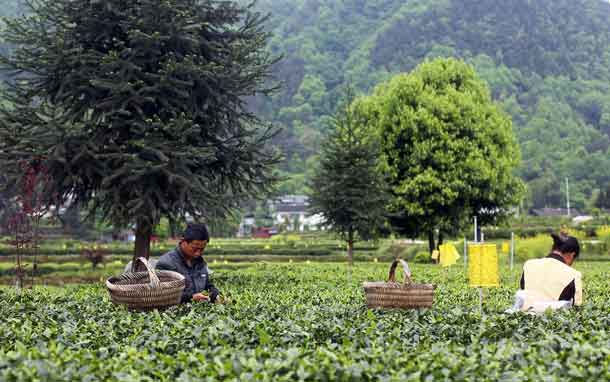

GUIZHOU – FOOD NOW – As a Chinese tea farmer in the 1990s, it would take Huang Da Can two hours to walk from Hetaoba Village to the town of Meitan in Guizhou to sell tea leaves.
It was an all too familiar way of life for the poor in the past. Unable to afford a car or motorcycle, walking was the only option for the mountainous 10 km journey to the nearest tea market.
“We had to carry bags of tea and walk to Meitan, and if we were not able to sell our goods, we had to carry them back,” Huang said.
“It was very tough in the past. We only knew how to grow tea but we didn’t even know how to grow tea well.”
“But with economic liberalisation and government-led initiatives, we gained knowledge and also obtained technologies to help us grow tea well.”
Since his early days as a tea farmer, the 45-year-old father of two has come a long way. He is now a small business owner with his own tea processing plant and provides employment to more than 60 people from his village.
It’s a success story that has been repeated across the province. In Fenggang County, Guizhou, where almost three out of four people work in tea related industries, only 2.57 per cent of the population lives below the poverty line.
“It is because of the tea industry that we have managed to almost completely eliminate poverty,” says He Bo, Head of Fenggang County Publicity Department.
“The income per capita of the farmers in our county is now almost 10,000 yuan ($1449.82). And in recent years, their income per capita has increased by more than 1000 yuan ($144.98) per year.”
In Guizhou province, more than half the population of 35 million work in tea or tea related industries. Tea is an undeniably crucial part of life for the citizens there and it permeates Guizhou culture at all levels.
Towns and villages have been developed for the sole purpose of furthering the tea industry. Tea plantations have also been rebranded as tourist attractions and attract millions of tourists every year.
And at the 2017 Guizhou Tea Expo, it was announced that the tea industry experienced a 20% year-on-year growth in production in 2016.
Premium tea may not be traditionally associated with Guizhou, but the province produces some of the finest tea in China, thanks to its unique location and weather, which create the perfect growing conditions. High altitude and low latitude, coupled with year-found fog gives its tea a subtle sweetness not found in tea from other parts of the country.
Currently the leading producer of tea in China with an annual output worth 29.9 billion yuan ($4.33 billion), Guizhou is also one of the poorest and most under-developed provinces.
Fortuitously though, this lack of development means that factories are scarce and pollution is low. The resulting clean air, water and soil give Guizhou a distinct advantage in the agricultural sector.
In keeping with strict state and national standards, farmers are required to use all-natural methods to maintain the quality of their tea. Completely organic and free from chemicals, tea crops in Guizhou are kept healthy with insect traps such as sticky boards and ultraviolet light traps.
It is this combination of a pollution-free environment and exacting farming standards that makes Guizhou tea so highly sought after.





